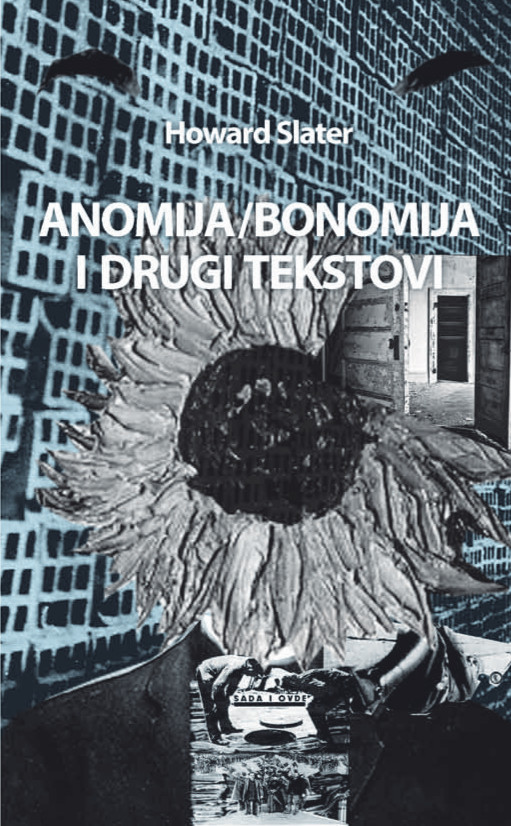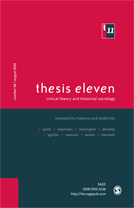Howard Slater: Anomie/Bonhomie & Other Writings (2012/2013) [Serbo-Croatian]
Filed under book | Tags: · affect, capitalism, media theory

In this collection of writings, Howard Slater improvises around what Walter Benjamin could have meant by the phrase ‘affective classes’. This ‘messianic shard’ and its possible implications leads Slater to develop a therapeutic micro-politics by way of a mourning for the Workers’ Movement and a grappling with the ‘becomings of capital’.
The essay “Anomie/Bonhomie” is the keystone of this book which also features tributary texts and poems drawn from the past ten years. These supplementary texts approach such themes as exodus, species-being, surrealist precedents, poetic language and the possibilities for collective ‘affective’ practices to combat capitalism’s colonisation of the psyche.
Originally published by Mute, London, 2012
Serbo-Croatian edition: Anomija/Bonomija i drugi tekstovi
Translated by Dušan Đorđević Mileusnić, Đorđe Čolić, kuda.org, GKP (under copyleft license)
Publisher kuda.org, Novi sad, 2013
ISBN 978-86-88567-06-0
164 pages
via Anthony Iles
commentary and English version of the Preface/Afterword and additional material (Mute.org)
publisher
Thesis Eleven 107(1): Special Section on Friedrich Kittler (2011)
Filed under journal | Tags: · media archeology, media theory, technology

“Friedrich A. Kittler was the most important, original and controversial German media theorist of his time. Departing from a philological background in German literature and arriving at a theory that combines the questions of technology, discourse and power, his oeuvre has had considerable impact on scholarship in the humanities over the past three decades. In contrast to Marshall McLuhan, who also started his career as a scholar in philology, Kittler’s theory is not anthropological in its epistemological set-up – media are not extensions of man; rather, Kittler’s theory is modelled after a Foucauldian-style archaeology but without Foucault’s ‘blind’ restriction to the medium of print.
Kittler’s works have either ‘produced’ ardent followers or have attracted vitriolic comments. These strong reactions to his works can in part be ascribed to his own academic style, which does not shy away from polemic commentary. Most of it is spurred by Kittler’s early desire to overcome a traditional type of literary criticism that ignores the impact of technology on the process of the production of meaning. And this lack of reflection is particularly apparent in the ‘art of interpretation’ (especially when this ‘art’ is relying on hermeneutics to justify its approach). Kittler’s work instead – strongly influenced by Shannon’s communication theory, Lacan’s writings on language and psychoanalysis and, as mentioned, Foucault’s archaeology of the humanities – attempted from early on to show how the technological dispositive (in various historical periods) is key to the cultural, societal and political environment at any time.
The scholarly articles and essays of this issue set out to introduce Kittler to the reader. The aim is to further a broader reception of his work in the anglosphere, and in particular in Australia, where he remains virtually unknown.” (from the Introduction)
With contributions by Geoffrey Winthrop-Young, Peter Krapp, Markus Krajewski, Matthias Bickenbach, Niels Werber, and Axel Fliethmann.
Publisher SAGE, November 2011
65 pages
PDF (updated on 2019-11-3)
Comments (3)Theo Röhle: Der Google-Komplex: Über Macht im Zeitalter des Internets (2010) [German]
Filed under book | Tags: · actor-network theory, google, internet, media studies, media theory, software, surveillance

Meistgenutzte Suchmaschine, weltgrößter Datensammler, teuerstes Medienunternehmen – es liegt nahe, »Google« als Supermacht zu bezeichnen. Und doch greift diese Beschreibung zu kurz.
Unter Bezug auf Michel Foucault sowie die Akteur-Netzwerk-Theorie entwickelt Theo Röhle ein präzises, relationales Verständnis von Macht, das den Blick auf die vielfältigen Interaktionen der beteiligten Akteure öffnet und ein komplexes System von Verhandlungen zutage fördert.
Eine zeitgemäße Analyse digitaler Medienmacht an der Schnittstelle von Medienwissenschaft, Informationswissenschaft und Surveillance Studies.
Publisher transcript, Bielefeld, 2010
ISBN 9783837614787
266 pages

